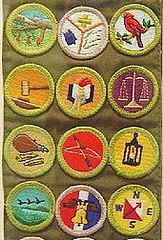| Merit Badges1 (Photo credit: stevejb68) |
- Student motivation: Most students attend for extra credit or because an instructor requires it. Very few attend just because they want to learn.
- Student engagement: Students have difficulty relating the workshop content to their coursework.
- Student accountability: Students only need to attend the workshops to earn the certificate. They do not need to demonstrate learning.
- Mixed audience: We’ll have students from several different courses at all levels of skill in the same workshop.
- Paperwork: We have to keep records of student attendance and the students need something to show instructors that they have attended the workshops.
Learning Badges
I have been exploring badges in learning and I believe they have the potential to alleviate some of these issues. A badge is “a special or distinctive mark, token, or device worn as a sign of allegiance, membership, authority, achievement, etc.” –Dictionary.com qtd. in Mozilla Foundation and Peer 2 Peer University. Its a way to award students for minor achievements.Online Badges
As I’m learning about badges, I am thinking about what it might look like in our program. I haven’t worked the details, but I do have basic structure in my mind. In my current vision, there are 4 levels of badges: Competence, Skill, Quest, and Activities. For each Quest, students would be able to select a number of specified Activities from a list of options, including in-person workshops, online tutorials and other challenges. Once a student completes all Quests for a skill, he/she will be awarded the Skill badge. Completion of all skills within a Competence level will lead to a Competence level badge. Each level of competence would build off the lower level, so completion of a higher-level Competence badge would require completion of all lower levels.Not all Activities, but some Activities would require submission of work for review. There might even be an option for peers to review the work of others. We would no longer need students to submit paper sheets, because their work and progress would be tracked by the badge system. We would also not need to provide “proof of attendance” because instructors could log-in to the system and monitor student progress.
Hypothetical IL Badges
I only have a rough outline of what the badges would be and the badge titles need a lot of refining, but the structure might look something like this.I. Competence
A. Skill
1. Quests
a. Activities
I. Basic Information Literacy: Developmental courses, including Learning Framework (required for all new-to-college students) and ESOL
A. Library Basics
1. Library tour: online or in-person
2. Library website
B. Search tools
1. Library catalog
2. Library databases
3. Search engines
4. Other search tools
C. Basics of source evaluation
1. Author
2. Publisher
D. Plagiarism Awareness
1. Spot plagiarism
2. Avoid plagiarism
II. Intermediate Information Literacy: First year courses
A. Sources
1. Types of sources
a. Reference sources
b. Books/eBooks
c. Periodicals
d. Websites
e. Others
2. Finding books in the library: LOC classification
B. Search Skills
1. Searching library tools
2. Searching web tools
C. Intermediate source evaluation: source content
D. Awareness of documentation/citation formats
1. Most commonly used formats
2. Citation Generators
III. Advanced Information Literacy: Second year courses
A. Research Topic
1. Developing an appropriate research topic/questions
2. Identifying topic concepts and search terms
B. Advanced Search Skills
1. Boolean
2. Truncation
3. Phrase Searching
C. Advanced source evaluation: purpose of source
D. Academic Integrity
Information Literacy Guru: Completion of all activities. (Remember, students can select which activities to complete so it is possible to earn the Advanced Information Literacy badge without completing all activities. This badge would recognize the students who “go above and beyond.”)
There would also be additional badges, including some students could award to other students for things like posting a good answer to a discussion board question or submitting great work. Students would also be able to export their badges for display to Mozilla’s Open Badge Backpack, an ePortfolio, and social media sites like facebook. Of course, training would be needed. We would offer in-person workshops and online tutorials for instructors and students.
I’m not sure if and when we will adapt badges. If we do implement badging, it will likely look very different from the above.
Starting a Conversation
Hopefully the above is at least enough to get the conversation started. I am excited to see how other librarians and educators implement badging. If you know of a project or have an idea, please share it in a comments below!Learn more about Open Badges and badges in Learning at the following sites.
Educause: 7 Things You Should Know about Badges
Open Badges FAQ
NYT: Beyond the College Degree, Online Educational Badges
More Links


3 comments:
Thanks for sharing this. We are considering our own info lit course (at a community college in western Canada), and your post here gives a frank appraisal of the challenges we might also face.
It's been a long time since you posted this -- have you had any opportunities to try out a badge system? I've been thinking about this recently -- I'm a community college librarian in Oregon, interested in how we can motivate more students to learn information literacy skills.
I'm currently developing something to try out in the spring. I'm using Passport: openpassport.org. A pilot group of students will attend 1 in-person class and then earn the certificate by completing badges. In what ways are thinking about using badges?
Post a Comment